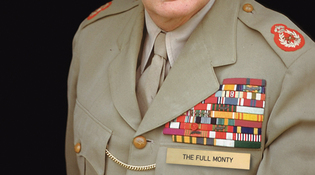 loading
loading
Arts & CultureYou can quote them: The full montyThe search for the original “full monty.” Yale law librarian Fred R. Shapiro is editor of the Yale Book of Quotations.  John Paul ChirdonView full imageIn my last column I wrote about the cryptic origins of the widespread phrase “the whole nine yards.” This is the best-known of a class of American expressions, such as “the whole shebang” and “the whole enchilada,” meaning the entirety or full extent of something. In Britain the equivalent term is “the full monty.” It also has a specific sub-sense of total nudity, popularized by the 1997 movie The Full Monty. “The full monty” is an etymological mystery. The most common origin theories relate to a World War II general and an English tailor. (The third most popular derives from the card game three-card monte, but I won’t pursue it here.) Field Marshal Bernard Law Montgomery, a celebrated British commander in World War II, was born to be the stuff of legend. Perhaps the greatest prima donna among military leaders in a war that also included such formidable figures as George S. Patton, Douglas MacArthur, and Charles de Gaulle, Montgomery had a persona memorable enough that his nickname, “Monty,” helped inspire the name of the comedy troupe Monty Python’s Flying Circus. Many believe “the full monty” alludes to various excesses of the field marshal, such as his famous self-assurance, or to the array of his full set of medals. The most common explanation, as Michael Quinion describes it in his website World Wide Words, centers on Montgomery’s fondness for “the traditional English breakfast of bacon, eggs, fried bread, tomato, mushrooms, toast, and cup of tea”—reputedly “even in the desert during the North African campaign.” The other most popular theory of the origins of “the full monty” is, in the words of the Oxford English Dictionary, “a colloquial shortening of the name of Montague Maurice Burton (1885–1952), men’s tailor, [referring] originally to the purchase of a complete three-piece suit.” The early recorded occurrences of “full monty” were concentrated in the north of England, jibing with the fact that Burton’s shops started in Derbyshire and were later headquartered in Sheffield (and later Leeds). His firm became a renowned chain, the world’s largest of its kind, so the OED and others regard this origin story as plausible. However, there is no actual documentation for either theory, and as I’ve often said, colorful etymologies are appealing but nearly always wrong. A “Wordhunt” sponsored by the OED and BBC in 2005 turned up the earliest known clear-cut usage—which was quite recent, from 1985. The 1982 Manchester Yellow Pages were also found to have listed two fish-and-chips restaurants named “The Full Monty Chippy.” Thus we have a large gap between the 1940s provenance usually posited (for both the General Montgomery and three-piece suit derivations), and the earliest printed attestation. Dear readers, this is another riddle for which I do not have a definitive answer. But I can push back the citational trail. In the ProQuest company’s online Entertainment Industry Magazine Archive, I unearthed the following in the British periodical The Stage and Television Today, August 30, 1979: “Cannon and Ball… began as a singing duo when they were welders in an engineering firm. Their comedy act started almost by accident.… ‘We went out one Friday night to a pub with the boys and after a while we got up and sang a song. There was a fellow sitting there with the full monty on, big gold rings, all that. “I’m from London,” he said. “You come back with me and I’ll sign you up.”’” We can take this evidence at least as a further link to the north of England—Cannon and Ball were from Lancashire—and can note that, because “monty” is not capitalized, the potential connection with Montgomery or Montague is weakened.
The comment period has expired.
|
|